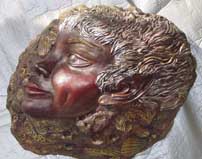A Spice of Life Never Strained

"The quality of mercy is not strain'd,
It droppeth as the gentle rain from heaven
Upon the place beneath: it is twice blest;
It blesseth him that gives and him that takes:
'Tis mightiest in the mightiest: it becomes
The throned monarch better than his crown...
It is enthroned in the hearts of kings,
It is an attribute to God himself;
And earthly power doth then show likest God's
When mercy seasons justice."
William Shakespeare
The Merchant of Venice
Act IV, Scene I
Compassion, pity, tolerance, and forgiveness...there are many ways to define the word “mercy,” but the difficulty that people often have with each of these concepts that mercy encompasses is a singular struggle. In The Merchant of Venice, the character Portia pleads on behalf of Antonio whose life hangs in the balance because of Shylock’s contract which gives him the right to cut out a pound of Antonio’s flesh. Shylock is fueled by vengeance, and although his contract gives him the right of law, Shylock’s hunger to fulfill the contract causes him to lose something much more valuable than legal redress; he loses his own humanity.
What could distort someone into a monster who craves another’s flesh above all else even when the punishment is grossly disproportionate to the crime? The answer to this question was ageless even in Shakespeare’s time, and it is a vice that we all still struggle with today. The answer is unrelenting vengeance and lack of empathy that blinds us to the power of forgiveness. How many times have we all held grudges against people for wrongs both real and imagined that people have committed against us? The degrading influence of vengeance corrupts on all levels from the trivial insult to the crimes heard in courts of law. From the cruel monarch who mindlessly slaughters his own people who resist him to the office gossip who ruins reputations and makes enemies of friends, vindictiveness and vengeance affect us all even to the point that we strike out without real evidence of any wrong. How many times have we all sought to hurt others through gossip and rumor when evidence of the other’s offense is based on only rumor as well?
I do not mean to say that justice should not be carried out in the presence of a crime. On the contrary, people must be held accountable for their actions, and this is especially true in a court of law. However, as Portia states, justice must be seasoned with mercy. The law is an impartial, unfeeling instrument that must be wielded by people who strive to exercise mercy and forgiveness when at all possible. Law is only words and numbers, but people must be more. We cannot weigh a person’s worth in pounds; a person must be judged as a human being and not as a pound of flesh. This is why mercy is so important. The quality of mercy is that it is one of humanity’s brightest flames and exercising our humanity can never be strained. Mercy can manifest itself in many different forms including pity, forgiveness, and simple consideration. Because all of these forms represent a type of mercy, this means that exercising it does not entail that a crime goes unpunished. Forgiveness is a mercy that we give not only to the accused, but also to ourselves. “It blesseth him that gives and him that takes” because it replaces bitter hate with the peace that is felt when we can truly say that we have punished in the name of justice and not simply in the service of our own hate.
We must all strive to season our own personal sense of justice with the quality of mercy. Mercy does not close our eyes, but instead it opens them so that we can truly judge offenses clearly. How many trivial or unfounded lawsuits could be dropped and how many families could resolve feuds whose true cause has long since been forgotten?
Many might ask when the line is crossed between mercy and the indulgence of a wrong. The answer is echoed in countless cultures and religions and is illustrated in the phrase, “Do unto others as you would have done to you.” The continuance of this phrase even to the point of being cliché is a testament to the power of mercy as an essential virtue for humanity. Some offenses must certainly be punished, maybe even to the point of death in some extreme instances, but we must all stop and ask ourselves if the punishment fits the crime. In our every day lives, we should all strive to question ourselves, “Have we committed the same crime that we refuse to forgive?” If the answer is yes, then we must strive to see the human being who stands behind the offense. How can we ask for mercy for our own inevitable failings when we have none to give in return? Maybe the spice of life is the virtue of mercy that allows us to revive what has been spoiled and bring new life to those that give and receive its quality.
Can you think of instances in worldly affairs or your own personal life where mercy might have prevented unneeded pain and suffering?
How do you define mercy in your own personal life?
Is real justice more dependent upon each individual’s humanity and virtue than it is on written law?
As a Christian, I believe people come closest to the divine presence when they exercise the mercy that Jesus showed when he forgave humanity its faults. What are instances of mercy in other religions, belief systems, or in other Christian examples as well that point to mercy being a divine quality?
How many religious texts and pieces of literature from countless cultures exalt mercy as a principal virtue?
Have a wonderful week!
--Carrie Goertz

 Breaking The Mold Studio
Breaking The Mold Studio

